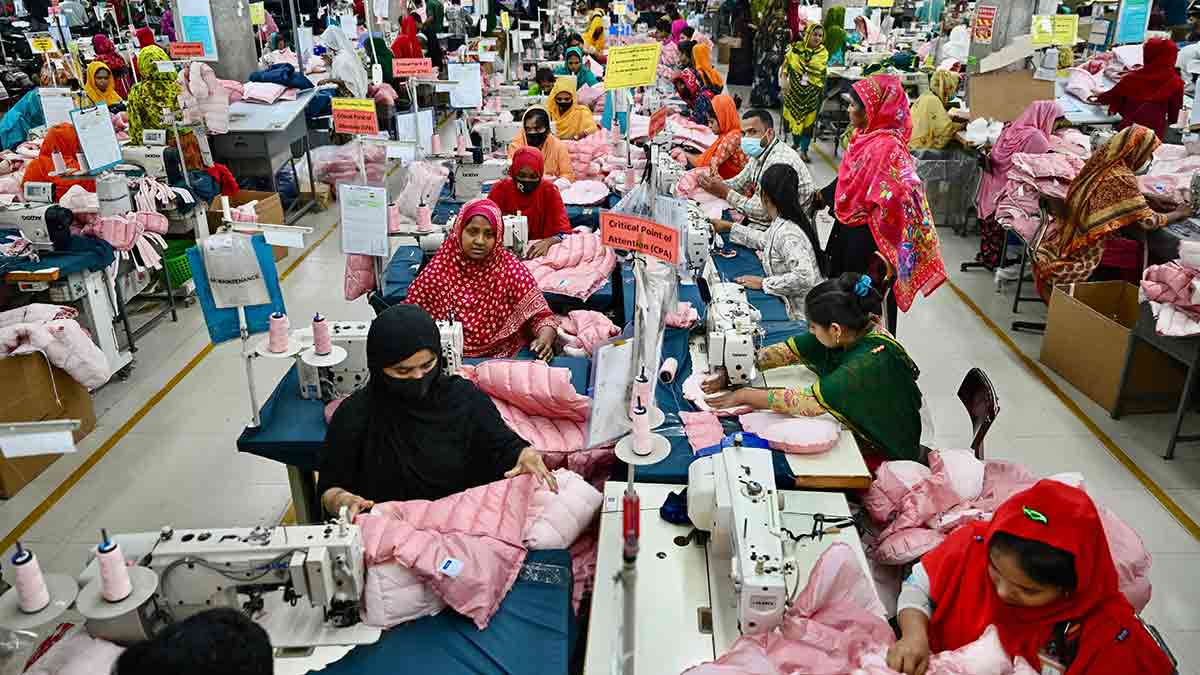BNP’s reform agenda addresses Bangladesh's core challenges
 (FILES) Workers are engaged at their sewing stations in a garment factory in Savar, on the outskirts of Dhaka, on April 9, 2025. US President Donald Trump ordered the reimposition of tariffs on dozens of trading partners on July 31, 2025 -- his cornerstone strategy for reshaping global trade to benefit the US economy. However in a minor reprieve, the White House said the measures will take effect in a week, not on August 1 as previously expected. (Photo by Munir UZ ZAMAN / AFP)
(FILES) Workers are engaged at their sewing stations in a garment factory in Savar, on the outskirts of Dhaka, on April 9, 2025. US President Donald Trump ordered the reimposition of tariffs on dozens of trading partners on July 31, 2025 -- his cornerstone strategy for reshaping global trade to benefit the US economy. However in a minor reprieve, the White House said the measures will take effect in a week, not on August 1 as previously expected. (Photo by Munir UZ ZAMAN / AFP)
Bangladesh today stands at a historic crossroads. It has been a year since the interim government, led by Prof Muhammad Yunus, assumed office, ushering in a period of cautious optimism amid complex challenges. Under Yunus’s leadership, the government has made some progress in curbing rampant corruption, depoliticising the civil service and ensuring media freedom.
However, concerns persist regarding the slow pace of economic recovery, delays in implementing much-needed institutional reforms, rising youth unemployment and insufficient attention to critical social sector reforms in health, education and agriculture. The government now faces growing public demand for the establishment of a people-centred, democratically elected government, along with urgent expectations for tangible improvements in livelihoods, social protection and service delivery that directly affect ordinary citizens.
Decades of economic growth may have transformed the country’s skyline and urban landscape, but this growth has been unevenly distributed. The rich have grown richer, the poor have become poorer and the once-promising middle class now bears the crushing weight of economic stagnation and rising living costs. Beneath the surface of glittering infrastructure lies the harsh reality of widespread poverty, poor health, malnutrition and a crumbling education system that continues to betray the hopes of millions.
The cries of mothers who fear losing a child to curable illnesses, the frustration of young people deprived of meaningful education and employable skills, the dismay of families trapped in intergenerational poverty—these are not isolated experiences but the lived realities of countless Bangladeshis. They want leaders who listen, policies that uplift and a governance system that serves, not exploits. They demand a Bangladesh where the human spirit is nurtured and every individual is given the tools to thrive in an increasingly competitive world.
At the centre of this national yearning lies a simple yet urgent proposition: investing in people, not just infrastructure. Despite GDP growth over the past two decades, Bangladesh ranks 129th on the Human Development Index and continues to suffer from deep deficits in health, nutrition and education. More than 24 per cent of children under five remain stunted, around 29 per cent of women of reproductive age are anaemic and nearly 58 per cent of ten-year-olds cannot read and comprehend a simple age-appropriate text. These failures are not incidental, they are structural weaknesses that threaten to derail Bangladesh’s aspirations for middle-income status and beyond.
People seek a health system where no one lives in fear that illness will lead to financial ruin or an untimely death. They yearn for a nation where no child is too weak or malnourished to learn, where every woman is freed from the preventable scourge of anaemia and poor nutrition and where no family is condemned to poverty because of inadequate health care. They dream of an education system that equips the youth with practical skills, digital literacy and global competencies to thrive in an increasingly competitive world.
Realising these aspirations demands more than rhetoric; it calls for transformative leadership, a coherent and bold strategy and an unwavering political commitment to put people first. Only through such a purposeful and people-centred approach can Bangladesh unlock the full potential of its citizens and build a society grounded in dignity, opportunity and justice for all.
The people of Bangladesh aspire to live in a country where no one dies for lack of quality treatment and where universal health care is a reality. They envision a nation where every woman and child is freed from the grip of malnutrition through an integrated approach that links health, education and social protection in a cohesive national strategy. In education, people dream of a system where the word ‘dropout’ becomes a relic of the past and every child, regardless of background or circumstance, completes their education equipped with the skills, confidence and competencies needed to thrive in a modern, dynamic economy.
Tarique Rahman, the acting chairperson of the Bangladesh Nationalist Party-BNP, has outlined a vision to transform Bangladesh by investing in health, nutrition and education, which are areas proven globally to drive equitable development. His 31-point state reform agenda draws on successful models from both Bangladesh and abroad, where integrated, community-based approaches have effectively reduced poverty and improved human well-being. This vision emphasises the importance of professional expertise, transparency and institutional integrity to ensure reforms are efficient, equitable and impactful. At its core, it aspires to build a Bangladesh where no one is left behind, youth and women are empowered and every citizen has the opportunity to lead a life of dignity and prosperity.
The author is adviser to Tarique Rahman, acting chairperson of the BNP, and former World Bank senior leader.
The Week